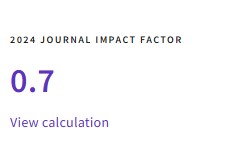Submissions
Submission Preparation Checklist
As part of the submission process, authors are required to check off their submission's compliance with all of the following items, and submissions may be returned to authors that do not adhere to these guidelines.-
As part of the submission process, authors are required to check that their submission meets all of the elements shown below. Submissions that do not comply with these guidelines will be returned to the authors.
The submission has not been previously published or submitted for consideration by any other journal (or an explanation has been provided in the Comments to the Editor).
The submission file is in OpenOffice, Microsoft Word, RTF or WordPerfect format.
Whenever possible, URL addresses are provided for references.
The text is single-spaced; 12 dots of font size; italics are used instead of underlining (except for URLs); and all illustrations, figures and tables are placed in the appropriate places in the text, rather than at the end.
The text adheres to the stylistic and biliographic requirements summarized in the Author's Guidelines, which appear in About the Journal.
If submitting to a peer-reviewed section of the journal, follow the instructions in Securing an Anonymous Evaluation. - The letter to the Editor is sent using the template provided on this page.
- An anonymised copy of the paper is uploaded (without authors) as reported on this page.
- For all authors (both in Spanish and English) the following have been included IN THE PLATFORM: their place of work, e-mail address, country and ORCID.
- The title of the paper, in English and Spanish, has been uploaded to the platform in lower case.
- When including the keywords in the platform, both in English and Spanish, they are uploaded one by one and ‘ENTER’ is pressed each time a new word is included. (Avoid copying from the paper all the words and then pasting them all at once into the platform).
Copyright Notice
All the contents published in Revista Iberoamericana de Ciencias de la Actividad Física y el Deporte are subject to the Creative Commons Reconocimento-NoComercia-Compartirigual 4.0 license, the full text of which can be found at <http://creativecommons.org/licenses/by-nc-sa/4.0>
They may be copied, used, disseminated, transmitted and publicly exposed, provided that:
The authorship and original source of your publication (Journal, editorial and URL of the work) are cited.
They are not used for commercial purposes.
The existence and specifications of this use license are mentioned.

Copyright is of two kinds: moral rights and patrimonial rights. Moral rights are perpetual, inalienable, inalienable, inalienable, inalienable and imprescriptible prerogatives.
In accordance with copyright legislation, Revista Eviterna recognizes and respects the moral rights of the authors, as well as the ownership of the economic right, which will be transferred to the University of Malaga for dissemination in open access.
The economic rights refer to the benefits obtained by the use or disclosure of the works. Revista Iberoamericana de Ciencias de la Actividad Física y el Deporte is published in open access and is exclusively authorized to carry out or authorize by any means the use, distribution, disclosure, reproduction, adaptation, translation or transformation of the work.
It is the responsibility of the authors to obtain the necessary permissions of the images that are subject to copyright.
Privacy Statement
Names and email addresses included in this journal will be used exclusively for the purposes specified and will not be provided to third parties or used for other purposes.












9.png)
